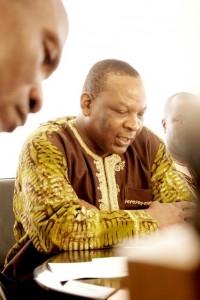The Environmental Rights Action/Friends of the Earth Nigeria (ERA/FoEN) has expressed pessimism about the outcomes of the United Nations Climate Change Conference (COP 20) that held this month in Lima, describing the failure of developed nations to cede ground on contentious issues beneficial to poor countries as a reminder of the “missteps” of previous talks.
About 196 nations that gathered in the Peruvian capital city agreed that each should present a plan in 2015 for individually reducing greenhouse gas (GHG) pollution. Demands from poorer countries received little attention at the talks, including a proposal that nations like the United States be more explicit on how billions of dollars will be deployed to developing nations to cope with increasing temperatures, storms and rising seas, among other impacts.

ERA/FoEN Executive Director, Godwin Ojo, said: “The climate talks turned out to be the relay of previous meetings where the same issues were tabled and yet no concrete concessions made by the polluting nations. It’s a shame that the meeting was driven by behind the scene deals and negotiations which were not transparent.”
Ojo explained that the polluting countries that drove the process as was the case in the past talks still rejected issues of adaptation, finance, technology transfer, and capacity building which are key to mitigation of the impacts of their appetite for fossil fuels and other polluting.
He added: “Evidently, the talks were built on quick sand with no concrete proposal for Paris COP 21 next year. We have said it time and again that the historical responsibility for the payment of climate debt by developed countries in the provision of finance, technology transfer, and capacity building have been grossly sidestepped and on a wrong footing.
“With the impacts of climate change already being felt in vulnerable communities around the world, the need for immediate action is now, even as the US and other wealthy nations still foot-drag on finance to emissions and other critical issues that poor nations have raised.”
Poor countries urged the U.S. and nations in Europe to consider strengthening the targets they’ve already announced for cutting greenhouse gases before and after 2020.
They argued that the Lima agreement should require wealthy countries to broaden the scope of their carbon-reduction plans by including measures detailing their financial commitments to helping poor countries and their efforts to assist nations in adapting to the effects of climate change. Instead, the final text “invites” countries to consider including adaptation measures in their plans.
Poor countries want the US and other wealthy nations to set a clear path toward providing $100 billion a year in public and private money for climate aid by 2020. The Lima text however falls short of that, instead, “urging” countries to “provide and mobilise enhanced financial support.”
“The talks have shown that social movements can instigate processes of change that the climate talks fail to address. The outcome of the COP undermines historical responsibility putting pressure on developing countries without adequate support in financing and technology transfer. The urgent obligation of developed countries to provide climate finance is glaringly missing,” Ojo insisted.

International humanitarian and development organisation ACT Alliance is urging governments to stop gambling with the future of communities struggling with the impacts of climate change and to come to an agreement that reflects the urgent need for change on the ground.
The alliance questioned whether governments at the negotiating table actually share the belief in a resilient and sustainable future.
Mattias Söderberg, Co-chair of the ACT Alliance Advisory Group on Climate Change Advocacy, said: “The current proposals on the table are far from our vision, and far from the recommendations given by science. The proposal has been striped of ambition, fairness and concrete agreements that could promote progress towards a sustainable future. We need those at the negotiation table to work together to fix this.”
ACT Alliance is a coalition of more than 140 churches and affiliated organisations working together in 140 countries to create positive and sustainable change in the lives of poor and marginalised people regardless of their religion, politics, gender, sexual orientation, race or nationality in keeping with the highest international codes and standards.
“We see a vision of a resilient and sustainable future,” said Söderberg. “A future where everyone, everywhere in the word, has the same rights and possibilities to benefit from development. To make this vision come true, we need to go through a transformative change, towards a low carbon development. This is a global challenge, and thus we need a global cooperation and agreement about how to move forward.”
